Key takeaways:
- Candidate evaluation should prioritize understanding values, motivations, and community engagement over mere experience and credentials.
- Effective evaluation involves assessing past performance, communication skills, and alignment with community values to foster trust and connection with constituents.
- Utilizing tools like voter feedback, media analysis, and personal interactions enhances the evaluation process by providing deeper insights into a candidate’s authenticity and leadership potential.
- Personal narratives and accountability in addressing challenges can bridge gaps between candidates and voters, fostering trust and relatability.
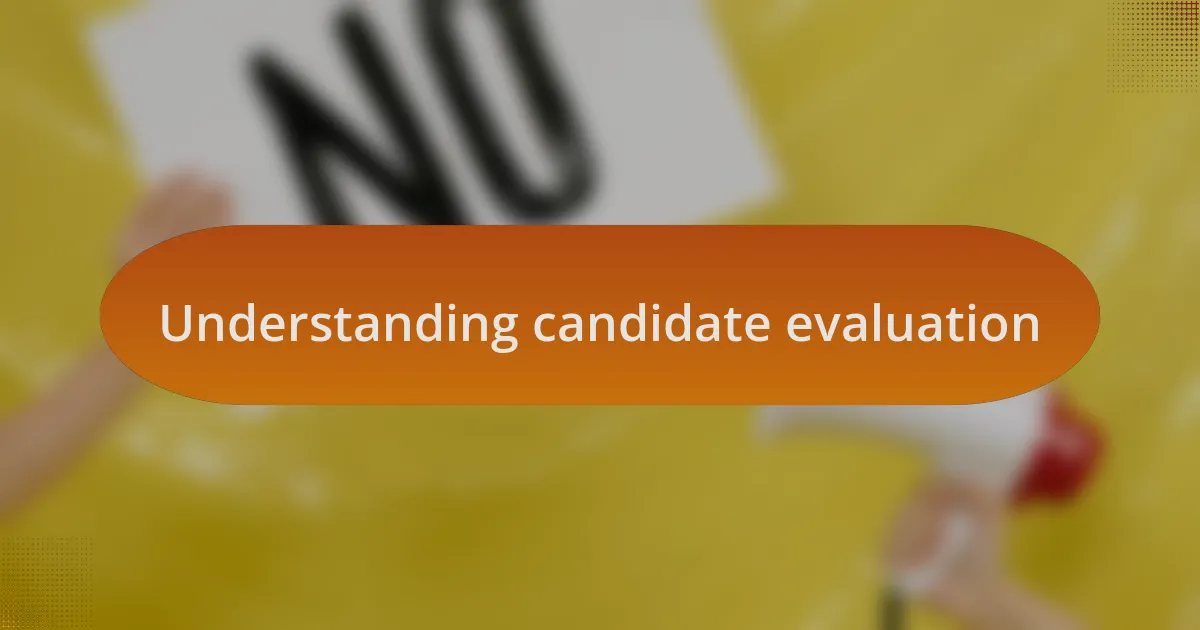
Understanding candidate evaluation
Candidate evaluation is a multifaceted process that goes beyond surface-level assessments. I’ve found that understanding a candidate’s values, skills, and motivations can be as important as their experience. Have you ever interviewed someone who seemed perfect on paper but didn’t resonate personally? That disconnection can make all the difference.
In my experience, it’s crucial to dig deeper than just resume points. I often look for candidates who demonstrate a genuine passion for public service—those who have a story behind their interest in politics. I remember speaking with a young candidate whose grassroots activism stemmed from her childhood experiences; that connection made her dedication palpable and real.
Rhetorically, what are we really searching for in candidates? Are we looking for polished speakers, or are we in pursuit of authentic leaders who can connect with the electorate? Personally, I lean toward the latter, believing that emotional intelligence and relatability often trump mere credentials in effective political leadership.
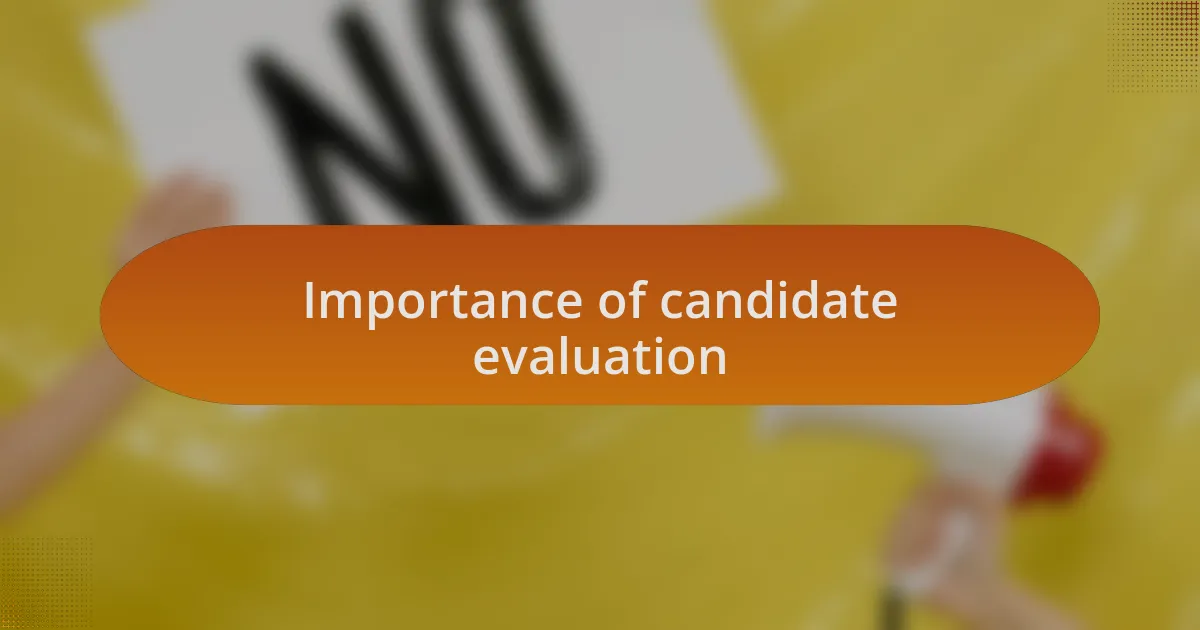
Importance of candidate evaluation
Evaluating candidates effectively is essential for ensuring they align with the values of the electorate. I recall working with a local campaign where our team focused on understanding candidates’ community engagement, which revealed their ability to empathize with constituents. It struck me how often public perception was shaped not just by a candidate’s policies but by their tangible connection to the community.
In my experience, thorough candidate evaluation allows us to view individuals as more than just potential officeholders. It unveils their motivations and authentic voices, which can be crucial in identifying leaders who inspire trust. I once met a candidate whose journey from community organizer to political hopeful illustrated a deep understanding of the struggles voters face, making it easier for others to see him not just as a name on a ballot, but as a relatable human being.
Why is it important to evaluate candidates carefully? Because the stakes are high. A candidate’s capacity to govern effectively hinges on their values and interpersonal skills. I’ve often found that when we invest time in understanding who candidates are rather than solely what they promise, we cultivate a political landscape rich with leaders who embrace collaboration and community-driven solutions.
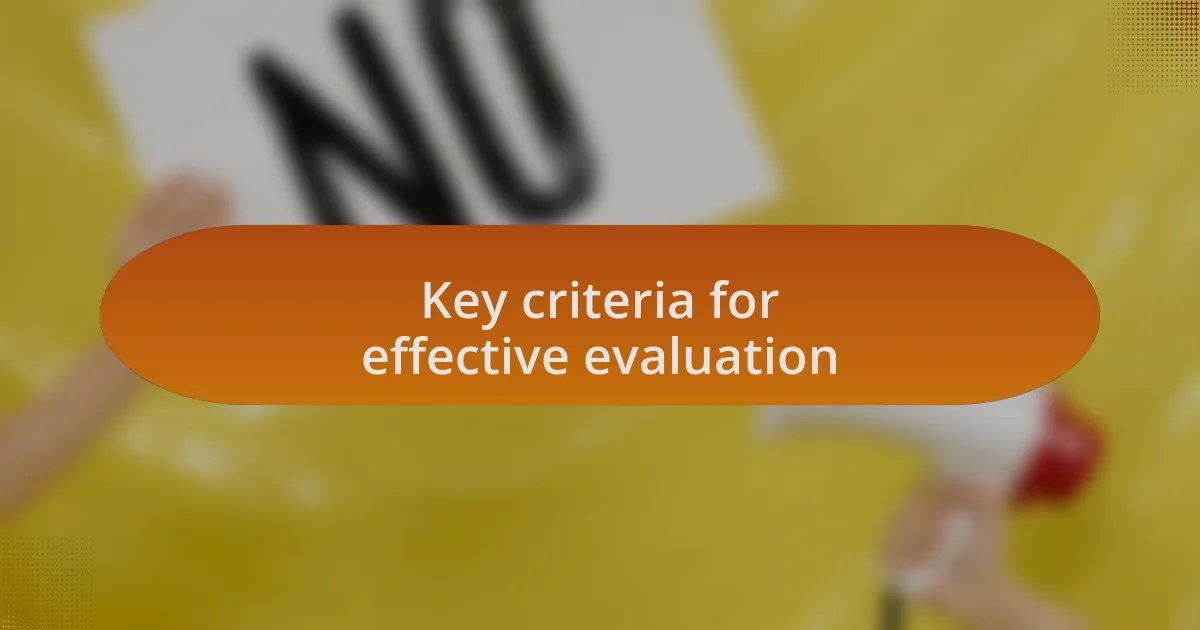
Key criteria for effective evaluation
When evaluating candidates, one key criterion I rely on is their past performance and experience. I remember reviewing a candidate who had built a successful grassroots campaign in their neighborhood. Their history of delivering tangible results made it easy to see their commitment and capability. Have you ever considered how a track record can be a strong predictor of future success? It’s often in these real-world experiences that the most revealing insights emerge.
Another critical aspect is the candidate’s communication skills. I once attended a debate where one candidate truly stood out, not just for their eloquence, but for their ability to connect emotionally with the audience. I realized then that a candidate’s capacity to articulate their vision and resonate with constituents is invaluable. Can you recall a moment when a candidate’s words moved you? It’s these moments that often linger in voters’ minds long after they leave the polls.
Finally, it’s essential to assess a candidate’s alignment with core community values. I’ve engaged with candidates who, despite their impressive resumes, struggled to connect with the cultural context of the electorate. This misalignment can create a disconnect, leaving voters feeling unheard. Have you thought about how deeply personal values influence voter trust? In my view, this connection is fundamental for authentic leadership, as it fosters a sense of shared purpose between the electorate and those who seek to represent them.
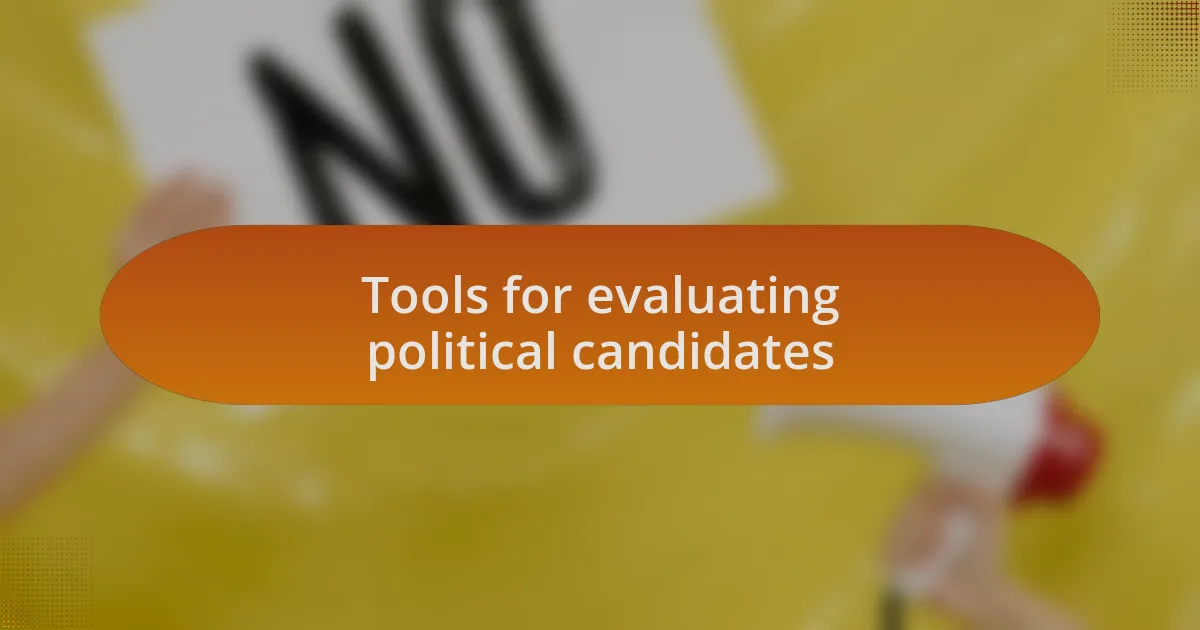
Tools for evaluating political candidates
When it comes to evaluating political candidates, various tools can enhance our understanding. I often use voter feedback and public opinion polls to gauge how well candidates resonate with the electorate. I remember reading a poll before an election that revealed surprising insights about a candidate’s popularity, showcasing how perceptions can shift quickly. Have you ever looked at how public sentiment can change the tide of an election? It’s fascinating how data can reflect the mood and priorities of the people.
Media coverage is another potent tool in my evaluation process. I often analyze news articles and editorials to understand a candidate’s public image and how they are portrayed in different outlets. I once came across an insightful editorial that dissected the implications of a candidate’s policy positions. It got me thinking: how much should media narratives influence our individual assessments? In my experience, while they offer valuable perspectives, it’s crucial to draw my conclusions based on a candidate’s actions and statements.
Lastly, engaging with community forums and attending town halls enriches my evaluation toolkit. I vividly recall a town hall where a candidate answered tough questions with genuine concern and transparency. The authenticity in their interaction made me rethink their viability. Have you ever felt a candidate’s sincerity when they speak directly to constituents? I find that these personal encounters provide an invaluable context that transcends what we can capture in statistics or written platforms.
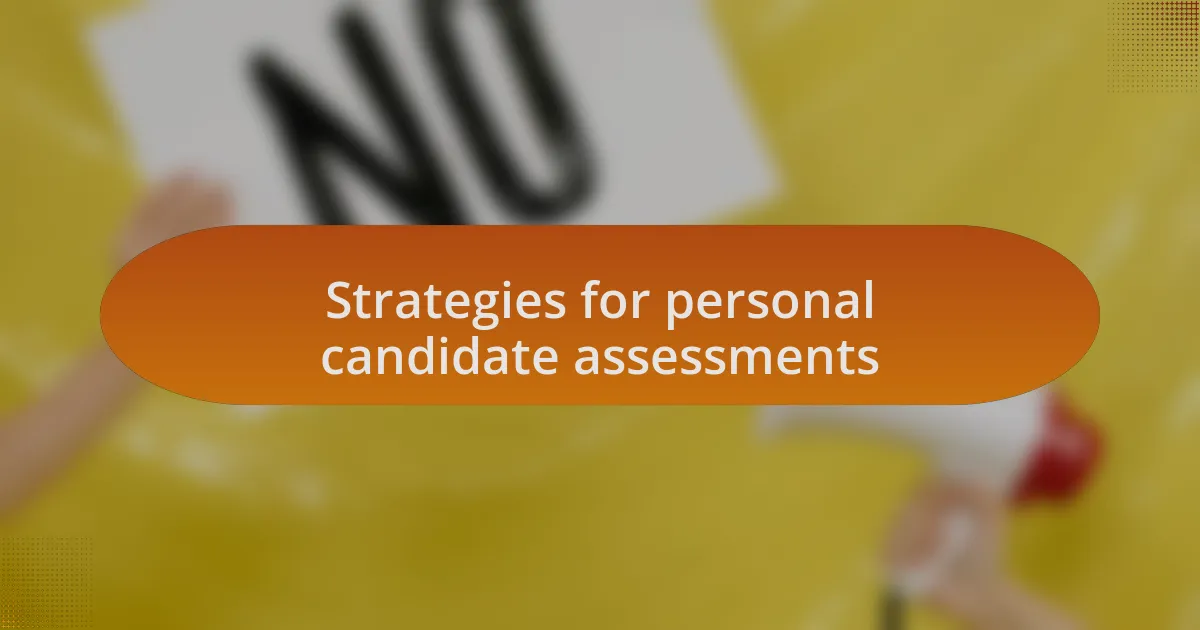
Strategies for personal candidate assessments
Assessing candidates on a personal level often hinges on evaluating their communication style and authenticity. I recall attending a campaign rally where a candidate shared their personal story about overcoming adversity. That moment resonated deeply with me. It made me reflect on how a candidate’s life experiences can shape their policies and priorities. Have you ever felt a candidate’s journey echo your own struggles? I find that personal narratives can bridge the gap between voters and candidates, fostering a connection that statistics alone cannot provide.
Another strategy I employ involves examining candidates’ responses to challenges. I vividly remember a debate where a candidate faced tough criticism about a past policy mistake. Rather than sidestepping the issue, they addressed it head-on, acknowledging their misstep and clarifying their growth since then. This level of accountability speaks volumes. It makes me think: are we more inclined to trust candidates who own their flaws? I believe that a willingness to admit mistakes is a vital trait that often indicates true leadership potential.
Engaging with candidates on social media platforms also offers valuable insights. A few months ago, I followed a local candidate’s online interactions and was struck by the way they responded to constituents’ concerns. Their thoughtful replies and willingness to engage in meaningful discussions helped me see them as approachable and grounded. In a world where political discourse can sometimes feel polarized, don’t you think personal engagement on social media can foster a healthier democratic process? I’ve seen firsthand how these interactions can shape my perception and assessment of a candidate’s character and values.
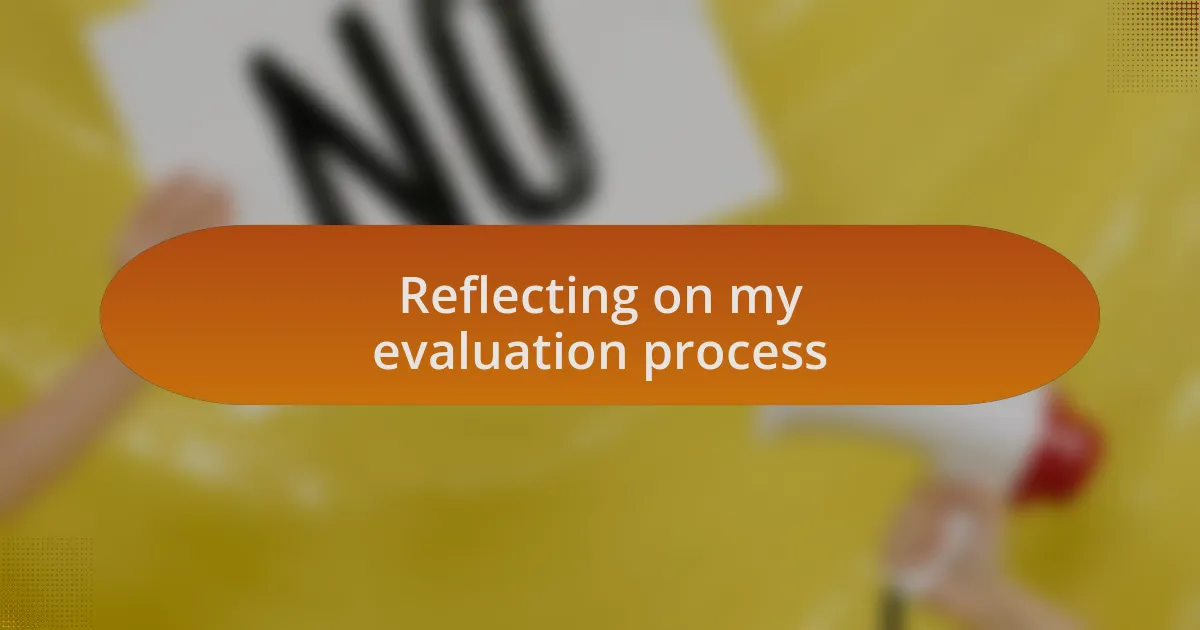
Reflecting on my evaluation process
When I reflect on my evaluation process, I often think about the power of intuition. During one town hall meeting, I could feel the energy shift when a candidate addressed questions from the audience. People leaned in, and you could almost see the spark of connection between them. It made me question how much of our evaluation is guided by gut feelings versus hard facts. Do we sometimes overlook that emotional resonance in favor of more sterile measures?
Another important aspect of my process is observation of body language. I vividly remember watching a candidate deliver a speech where their gestures were both confident and relatable. As they discussed their vision for the community, their eyes sparkled with passion. I found myself drawn in, not just by their words but by their demeanor. This experience reminded me that the way candidates present themselves can be just as telling as their policies. Have you noticed how a simple smile or a sincere nod can influence your perception of a candidate?
Additionally, I often reflect on how follow-up interactions shape my evaluations. For instance, a while back, a candidate I initially felt lukewarm about reached out after a local event to gather feedback. Surprised and pleased, I began to see them in a new light. Such engagement demonstrates a commitment to listening, which I value immensely. How many times have we seen that effort make a difference in our assessment?